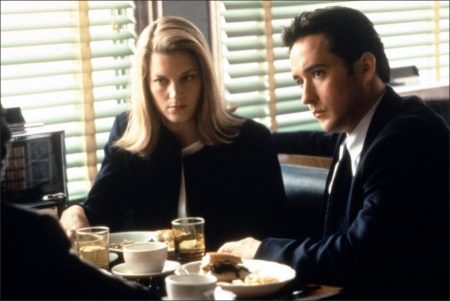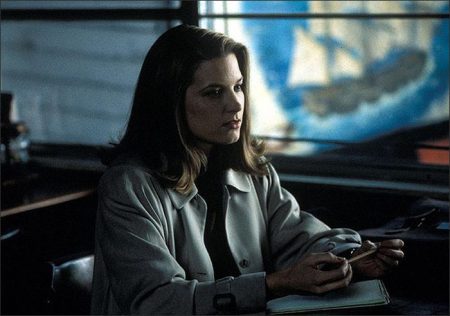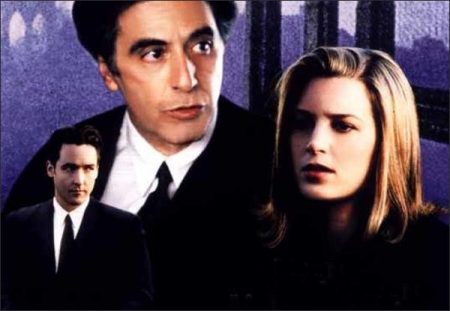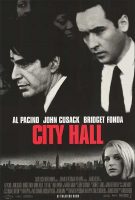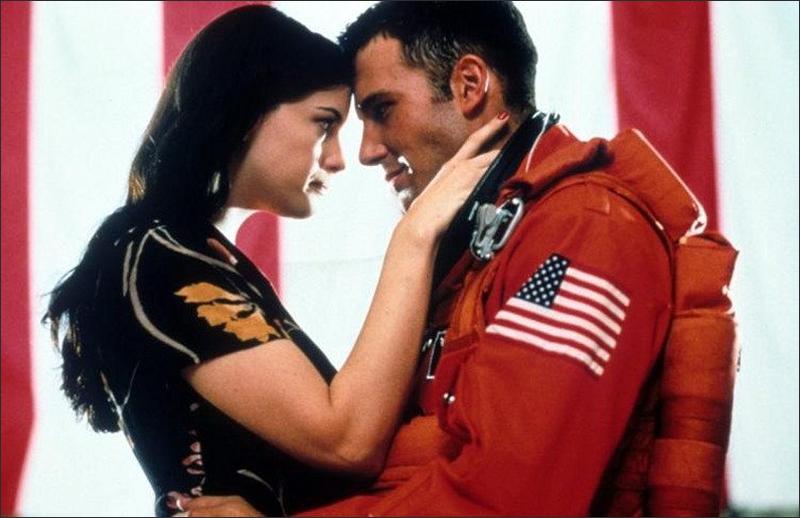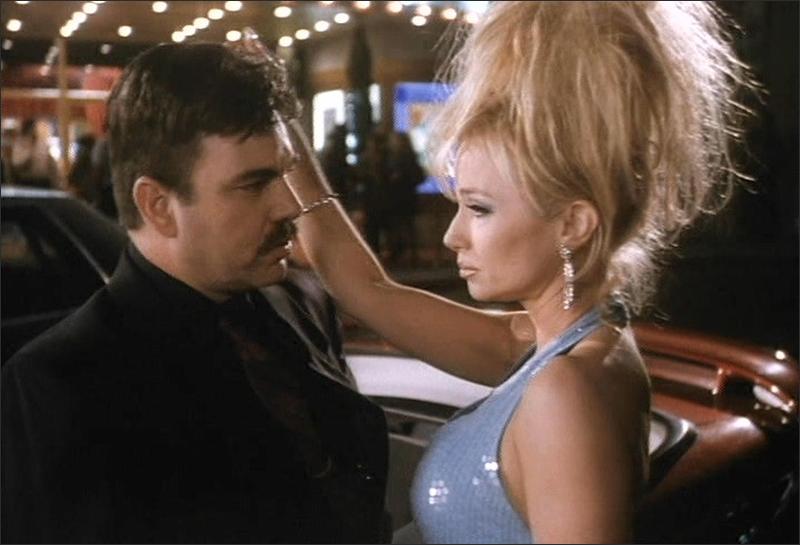Taglines: Murder… Corruption… Cover-up… Scandal…
City Hall movie storyline. In New York City, Detective Eddie Santos and mob figure Tino Zapatti kill each other in a shootout; a stray bullet also kills a child passing by. In the wake of the tragedy, questions are raised as to why Judge Walter Stern, an old friend of the ambitious Mayor John Pappas, had previously set the criminal responsible free on probation. Pappas’ loyal deputy mayor, Kevin Calhoun, decides to dig for answers. Meanwhile, legal aid Marybeth Cogan uncovers a conspiracy to smear Santos.
Calhoun’s investigation leads to Frank Anselmo, a Brooklyn politician who has connections to Tino’s uncle, crime boss Paul Zapatti. Anselmo plants money at Zapatti’s behest to frame Santos. Calhoun and Cogan continue to seek the truth from a number of sources, including Santos’ partner and another Zapatti relative. After the murder of probation officer Larry Schwartz, they ultimately conclude that Judge Stern had to be on the take. Pappas agrees that Stern must resign.
City Hall is a 1996 American suspense drama film directed by Harold Becker and starring Al Pacino, John Cusack, Bridget Fonda, Danny Aiello, David Paymer, Martin Landau, David Paymer, Anthony Franciosa, Lindsay Duncan, Luna Lauren Velez. The film was Becker’s second collaboration with Pacino, having directed him in Sea of Love (1989).
Film Review for City Hall
There’s a fine, revealing scene at the end of “City Hall” in which a young idealist and a seasoned politician recognize that they’re not as far apart as they once imagined. It’s a moving encounter, gracefully acted and believably staged, cognizant of the real and gritty New York in which this story is supposed to unfold. “City Hall” could have used much more of the same.
For this is a film of formidable ambitions, trying to locate an anatomy of New York crime, power and politics in a many-tentacled tale of urban corruption. Like Sidney Lumet’s “Serpico” and “Prince of the City,” films whose modus operandi it strongly recalls, “City Hall” looks for its authenticity in the pragmatic give-and-take of New York life.
And as directed by Harold Becker (“Sea of Love,” “The Onion Field”) and written by a blue-ribbon panel of screenwriting and reportorial talent, “City Hall” surely has all the ingredients of a comparably riveting expose. But this knotty investigative thriller has trouble achieving the rock-solid credibility to hold an audience in thrall.
The casting of Al Pacino as New York’s ambitious mayor, Astoria-born John Pappas, proves one of the film’s more believable aspects, right down to the fact that Mr. Pacino’s Mayor Pappas can sound as much like a preacher or a history professor as a veteran of political wars. And the role offers Mr. Pacino some opportunities to show off the inspired, manipulative cunning of his best film work. It also leaves him with too much cliche-riddled mayoral boilerplate in his dialogue, and with a role far more secondary than it first appears. Many of the story’s loose ends connect with Mayor Pappas, but he does not become a powerful enough presence to hold “City Hall” together.
Neither does Deputy Mayor Kevin Calhoun, the nice young Louisianan played by John Cusack with an expert, laid-back slyness that qualifies him as Mayor Pappas’s right-hand man. Though Calhoun is the film’s narrator and shoulders the burden of unraveling its investigative plot, he never quite assumes center stage either. Instead, the heart of this tale is out in Brooklyn, where Danny Aiello turns Frank Anselmo, county leader for the Democratic Party, into the movie’s real marvel. Mr. Aiello’s beauty of a performance rolls all of this story’s know-how about New York politics into one glad-handing, deal-brokering, voter-wooing package.
“City Hall” starts with a deadly encounter between a cop and a drug dealer. It involves a stray bullet that kills a 6-year-old child. The mayor, in the midst of greeting Japanese dignitaries in his well-honed public manner, is informed of this tragedy and senses it’s even worse than it looks. Sure enough, when Calhoun begins quietly investigating the shooting, he finds questions involving the mob, the possibilities of police and judicial corruption and a trail that leads a very long way. The trajectories of some characters, particularly Mr. Aiello’s Anselmo, are drawn from New York political scandals of recent years.
“City Hall” actually does a better job of getting to know its principals than of setting them into such melodramatic motion. Early in the film, there’s a wonderful scene showing Anselmo playing a breakfast round of quid pro quo with Brooklyn realtors and handling them with casual finesse. And Anselmo, who’s a softy for Rodgers and Hammerstein, has a remarkable meeting with the Mayor in the lobby of a Broadway theater, even if it makes him miss the best part of “Carousel.” Mr. Pacino is also in top form here, easily demonstrating how Pappas got to Gracie Mansion and may go even further.
These scenes are so good that much of the film’s subsequent cloak-and-dagger material is disappointing. It’s also confusing, with more plot leaps and convenient coincidences than any thriller could handle. Mr. Becker surrounds these events with a helpful mood of solemnity, but the casting of minor roles doesn’t always support the film’s seriousness. Particularly egregious is Bridget Fonda, nobody’s idea of an attorney for the Detectives’ Endowment Association, who shows up to comfort the cop’s widow. The widow is played by Lauren Velez, who gave such a fiery performance as a single mother in “I Like it Like That” but who this time has little to do.
Also in the supporting cast are Martin Landau as a judge whose record comes into question, Anthony Franciosa as a mob boss and David Paymer as yet another mild-mannered functionary, along with a wide array of offbeat character actors in tiny roles. “City Hall” doesn’t often have Mr. Lumet’s luck in casting these brief snippets so evocatively that they offer any insight into bureaucratic corruption. Instead, the film leans too heavily on ethnic stereotypes, and enhances that lack of subtlety with Jerry Goldsmith’s overpowering score.
The most curious credit for “City Hall” is the writing team, which includes Ken Lipper (a Deputy Mayor of New York in the Koch administration), Paul Schrader, Nicholas Pileggi and Bo Goldman. The result surely sounds like a screenplay by committee, with references from Pericles to Fiorello La Guardia, a Harry Truman quotation other than “the buck stops here,” and some memorable aphorisms (“National ink: the mother’s milk of politics”).
But the same script also reaches down to include “the die’s been cast,” “my way or the highway,” “a tough man, but he was fair” and (any time a mobster plans to hurt somebody) an offer to “have a little talk with him.” It’s a long way from Pericles to this.
City Hall (1996)
Directed by: Harold Becker
Starring: Al Pacino, John Cusack, Bridget Fonda, Danny Aiello, David Paymer, Martin Landau, David Paymer, Anthony Franciosa, Lindsay Duncan, Luna Lauren Velez
Screenplay by: Kenneth Lipper, Paul Schrader, Nicholas Pileggi, Bo Goldman
Production Design by: Jane Musky
Cinematography by: Michael Seresin
Film Editing by: David Bretherton, Robert C. Jones
Costume Design by: Richard Hornung
Set Decoration by: Robert J. Franco, Bruce Swanson
Art Direction by: Robert Guerra
Music by: Jerry Goldsmith
MPAA Rating: R for language and some violence.
Distributed by: Columbia Pictures
Release Date: February 16, 1996
Views: 161
